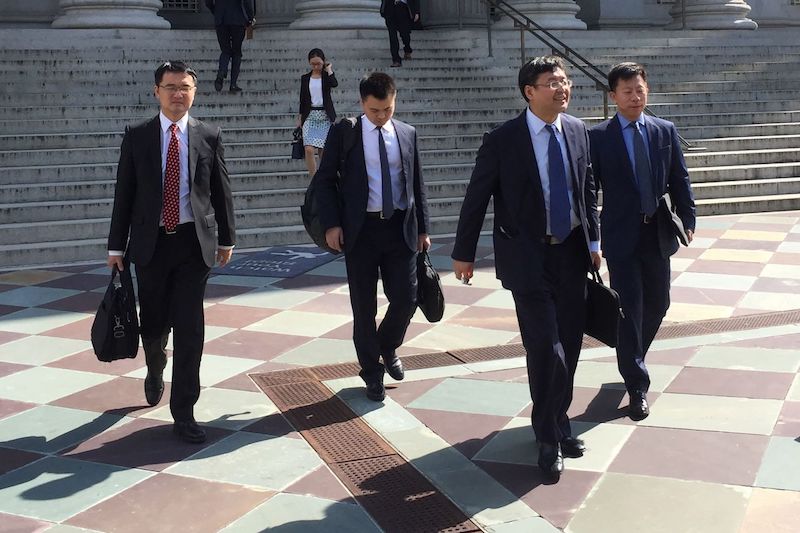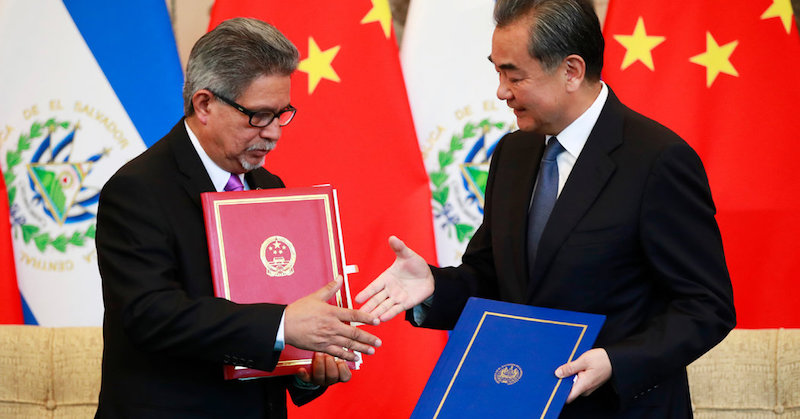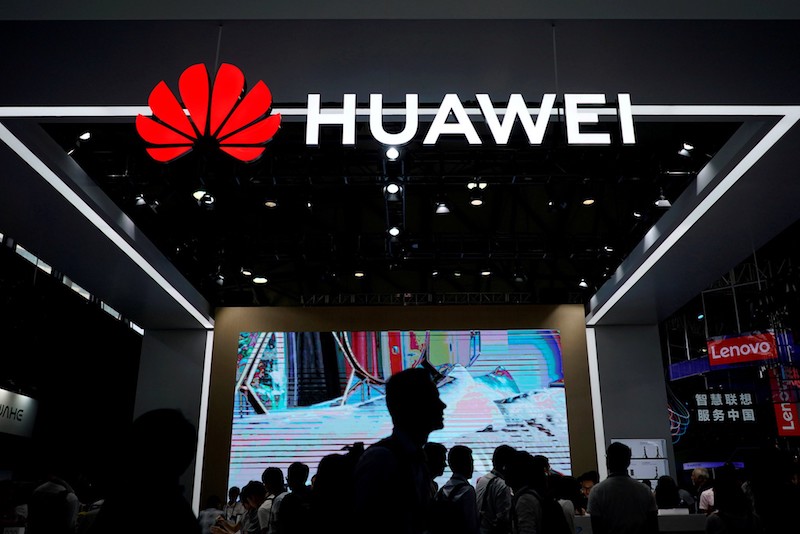
 Trade Talks Continue in DC as New Tariffs Hit
Trade Talks Continue in DC as New Tariffs HitOfficials from China and the U.S. met in Washington D.C. this week for the first time since May, in an attempt to revive trade negotiations. The last time officials from both sides met, Chinese Vice Premier Liu He and U.S. Treasury Secretary Steven Mnuchin came to an agreement to pause tariffs while negotiations were underway, a consensus broken only days later when President Trump announced he would seek to impose tariffs on $50 billion worth of Chinese goods.
As last week's China This Week noted, this week's talks were led by mid-level officials, U.S. Treasury Undersecretary David Malpass and Chinese Commerce Vice Minister Wang Shouwen, indicating a lack of optimism towards progress on the trade disputes and a possible desire from the Chinese government to wait for signs of progress before involving higher level officials. Prior to the talks, President Trump told Reuters that he did not expect significant progress and had no timeline for the end of negotiations: "I'm like them; I have a long horizon," he said.
The talks, which lasted two days, ended on Thursday. China's Commerce Ministry said the two sides had held "constructive and frank" discussions and would "maintain contact regarding the next steps." A White House spokesperson said China and the U.S. had "exchanged views on how to achieve fairness, balance, and reciprocity in the economic relationship, including by addressing structural issues in China." Despite the continuation of talks, China and the U.S. imposed new tariffs on $16 billion worth of each other's imports, which took effect on Wednesday. According the U.S. Chamber of Commerce, which released a new state-by-state analysis this week reflecting the new tariffs, "18 [U.S.] states saw the value of their exports subject to tariffs more than double. . .24 states have over $100 million in exports subject to the new tariffs, including Ohio, South Carolina, Tennessee, and Michigan."
 El Salvador Severs Taiwan Ties in Favor of Mainland China
El Salvador Severs Taiwan Ties in Favor of Mainland ChinaTaiwan suffered a diplomatic blow at the start of this week as the Central American nation of El Salvador severed its official ties with the island. El Salvador is the latest loss for Taiwan, after both the Dominican Republic and Burkina Faso cut ties earlier this year. This increased diplomatic isolation accompanied souring relations between the island and Beijing after the election of President Tsai Ing-wen, a member of the Democratic Progressive Party which has historically advocated for Taiwanese independence.
The United States declared its displeasure with the move in a statement saying it would "continue to oppose China's destabilisation of the cross-strait relationship and political interference in the Western Hemisphere." However, it may have been certain American policies, such as the decision to deport 200,000 El Salvadorans from the U.S., in concert with the country's nearly stagnant economy that motivated the switch. The El Salvadoran government confirmed its hopes for Chinese relief of its economic hardships; presidential spokesman Roberto Lorenzana noted, "Fundamentally, it's an interest in betting on the growth of our country with one of the world's most booming economies. . .El Salvador can't turn its back on international reality."
Chinese foreign ministry spokesman Lu Kang described the new ties with El Salvador as "perfectly justified and above board," and encouraged the U.S. to "correctly view" the relationship.
This most recent diplomatic swap may have serious implications, both domestically in Taiwan and internationally. As El Salvador is the third country this year to sever ties with the island in favor of mainland China, the current opposition party, the Kuomintang, may utilize these events to attack the Democratic Progressive's viability. On a larger scale, El Salvador's decision may lead to a competition for influence between China and the U.S. in Central America.
 Australia Bans Huawei's 5G Products
Australia Bans Huawei's 5G ProductsThe Australian government laid out new rules on Thursday that will block Chinese smartphone giants Huawei Technologies and ZTE Corp. from contributing to the country's 5G infrastructure development, citing national security concerns. Two Australian ministers explained that companies that "are likely to be subject to extrajudicial directions from a foreign government" would be excluded from the nation's 5G networks.
Huawei, the world's largest telecommunications equipment vendor, lashed out against what it called Canberra's "politically motivated" decision. "It is not aligned with the long-term interests of the Australian people, and denies Australian businesses and consumers the right to choose from the best communications technology available," the Shenzhen-based company said in a statement to CNBC. As a privately owned corporation, Huawei also stated that it has "never been asked to engage in intelligence work on behalf of any government," and claimed that Australia's decision undermines free trade. ZTE has not released a statement on the matter.
The United States has used similar rationale to block Huawei and ZTE in recent years, citing a Chinese legal requirement that citizens and businesses cooperate with Chinese intelligence agencies as a security risk. Canadian Prime Minister Justin Trudeau has not said whether Canada will join its two intelligence-sharing allies in banning Huawei from its 5G market. The Globe and Mail reports that Huawei has already established a market and a large network of relationships with research universities in Canada. However, various Canadian national security advisors are urging the government to join its American and Australian allies in barring the tech giant. In discussions with Canadian officials, U.S. National Security advisor John Bolton stressed the need for a continental strategy regarding China. How Tariffs are Taking a Toll on American FarmersThe recent trade war between China and the United States will leave about 1.7 million U.S. jobs subject to China's counter tariffs, hurting agricultural states that export their products to China. With these new tariffs, local economies and jobs hang in the balance. In our latest video, China-US Focus explores the effects of the trade war on American soybean farmers, a group that has already been dealt a pivotal blow due to Beijing's 25 percent tariff on U.S.-produced soybeans. Watch the video on our website.
How Tariffs are Taking a Toll on American FarmersThe recent trade war between China and the United States will leave about 1.7 million U.S. jobs subject to China's counter tariffs, hurting agricultural states that export their products to China. With these new tariffs, local economies and jobs hang in the balance. In our latest video, China-US Focus explores the effects of the trade war on American soybean farmers, a group that has already been dealt a pivotal blow due to Beijing's 25 percent tariff on U.S.-produced soybeans. Watch the video on our website.
Prepared by China-US Focus editorial teams in Hong Kong and New York, this weekly newsletter offers you snap shots of latest trends and developments emerging from China every week, while adding a dose of historical perspective.
- 2018-08-17 Trade Talks Back On
- 2018-08-10 American Natural Gas Industry Braces for New Chinese Tariffs
- 2018-08-03 Tentative Signs of U.S.-China Cooperation at the ASEAN Summit
- 2018-07-27 President Trump’s Trade War Bailout
- 2018-07-20 Xi Charms the World
- 2018-07-13 China Defends WTO Record in the Face of Additional U.S. Tariffs
- 2018-07-06 The Trade War Begins
- 2018-06-29 President Trump Chooses Slightly Softer Option on Chinese Investment
- 2018-06-22 Trade Tensions Spark Stock Sell-Off in China
- 2018-06-14 How “Comprehensive” Is the Kim-Trump Agreement?
- 2018-06-08 China Awards Putin First Medal of Friendship
- 2018-06-01 USPACOM Rebranded As U.S. Indo-Pacific Command
- 2018-05-25 Trump Cancels North Korea Meeting
- 2018-05-18 The On/Off Trump-Kim Summit
- 2018-05-11 American Goods Are Stuck at Chinese Ports
- 2018-05-04 China and the U.S. Lay Trade Demands on the Table
- 2018-04-27 U.S. Delegation Will Visit China Next Week
- 2018-04-20 China and the U.S. Seek Allies in Trade Dispute
- 2018-04-13 President Xi Reviews the PLA Navy
- 2018-04-06 China and Russia Pledge Military Cooperation in a Signal to the United States
